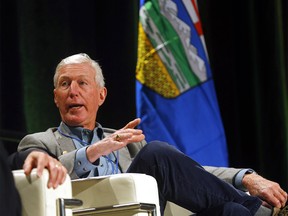Nearly every demand in the once-infamous letter is now top of the UCP government’s agenda

Article content
The Alberta Firewall letter, once a joke, has become entrenched reality.
Nearly every demand in the once-infamous letter is now top of the UCP government’s agenda.
Article content
Nobody is happier than Ted Morton, one of the seven who signed it in 2001, along with Stephen Harper before he became Conservative leader and prime minister.
“It feels good,” Morton, retired U of C professor and former PC cabinet minister, said in an interview.
Advertisement 2
Article content
“The Alberta agenda ideas are now pretty deeply embedded in provincial politics, and they’re not going to go away.
“How they’re going to work out, I don’t know. But these ideas have gone from fringe to mainstream.”
The letter called for creating an Alberta pension and withdrawing from the CPP; replacing the RCMP with a provincial police force; collecting personal income tax through a provincial agency; pressing for Senate reform; and assuming provincial control of health care, thus forsaking federal money.
The key points are all UCP aspirations or even encoded in law (the new Police Act).
The call for withdrawing from the Canada Health Act has no traction today, but don’t count it out for tomorrow.
The advocates are persistent and effective as they nudge these plans toward the mainstream.
They include Premier Danielle Smith and her key advisor Rob Anderson. They devised the “sovereignty” pitch — the Firewall agenda under a new name.
Albertans are aware of all this by now. And yet, Smith and the UCP appear to have retained the voter support that won them the election last May.
Article content
Advertisement 3
Article content
Recommended from Editorial
Morton has a book coming out in September called “Strong and Free; My Journey in Alberta Politics.”
It was a bruising trip, especially after he joined the Progressive Conservatives as an MLA and minister.
Premier Ralph Klein’s crew — and later Ed Stelmach’s — didn’t like his vision. “They were very resistant to me and to the ideas I was pushing,” he says.
Worse, some of Morton’s firewall allies were upset that he joined the PCs.
But he stuck with the governing party, twice running unsuccessfully for the leadership.
“Internal party fights are more bitter than cross-party fights,” Morton says, “and politics is hard on friendships.
“I had a couple of friendships destroyed. I watched a couple other people lose friendships over this.”
Through it all, Morton never wavered in the beliefs expressed in the Firewall letter.
It caused — appropriately — a political firestorm when the signatories sent it to Klein, who basically ignored it.
Advertisement 4
Article content
The letter was widely derided as extremist, separatist, divisive and dangerous.
Some people feel that the urgency will go out of this drive if the Trudeau Liberals lose the 2025 election and Conservative Leader Pierre Poilievre becomes prime minister.

Morton doesn’t believe that for a minute. In fact, he thinks Poilievre will be a willing partner in most of Smith’s plans.
“The RCMP is already talking about walking away from provincial policing. I think Poilievre would, if not facilitate it, at least certainly not block it.
“On the (federal) gun registry, on the electricity regulations, he’s already said he’s against most of that.
“The touchy one is the Alberta pension plan . . . it has major fiscal implications for the CPP. So, I think he’ll be much more careful about that.
“But on most of those other issues, I don’t think there’s much electoral risk to Poilievre in cooperating with Danielle Smith.”
Behind all this is the core belief that the problems are structural and can’t be solved until Alberta assumes more power.
A hostile government like the Liberals might inflame the tensions to help win support elsewhere.
A friendlier federal government could give the impression that the system is working.
But eventually, the issues will erupt again because of the political and structural inequities.
That’s what Ted Morton and his firewall successors ardently believe. And now, many more Albertans seem to believe it too.
Don Braid’s column appears regularly in the Herald.
Article content





